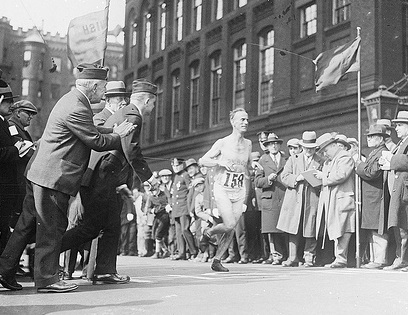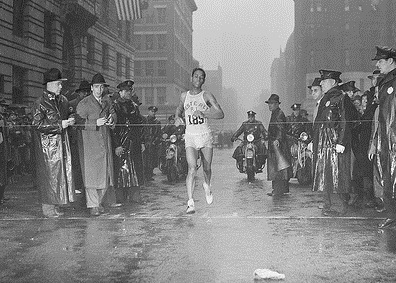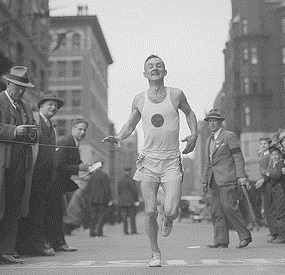Boston Marathon
Men
 Clarence DeMar holds the distinction of having won the most Boston Marathons, with seven victories to his credit spanning from 1911 to 1930. He also won the bronze medal in the marathon event at the 1924 Olympics in Paris.
Clarence DeMar holds the distinction of having won the most Boston Marathons, with seven victories to his credit spanning from 1911 to 1930. He also won the bronze medal in the marathon event at the 1924 Olympics in Paris.
A native of Ohio, DeMar moved to Keene, New Hampshire in 1929, where he taught printing and industrial history at Keene Normal School. Since 1978 the city of Keene has held the Clarence DeMar Marathon in his honor.
Image Credit:
Clarence DeMar winning BAA Marathon, 1927 or 1928
Copyright © Leslie Jones.
Boston Public Library, Leslie Jones Collection.
-
Marathon by Clarence DeMar; Colmen McCarthy (Introduction by)ISBN: 0933050097Publication Date: 1981-10-01The superb autobiography of the legendary seven-time Boston winner who won in 1930 at age 42 -- a runner truly ahead of his time.
A native of West Medford, Johnny Kelley competed in 108 marathons over the course of his career. He ran in a record 61 Boston Marathons and won in 1935 and 1945. In 1992 he completed his last full Boston Marathon at the age of 84, having become a much-beloved figure on marathon day every year. A statue depicting an elderly Kelley running with his younger self was erected in Newton in 1993.
Image Credit:
Johnny Kelley crosses the finish line, 1945
Copyright Leslie Jones.
Boston Public Library, Leslie Jones Collection.
-
Johnny Kelley, Beloved Icon of the Boston MarathonFrom the New England Historical Society
-
Young at Heart by Frederick Lewis; Dick Johnson (Editor); Kenneth H. Cooper (Introduction by)ISBN: 0941539873Publication Date: 1992-03-01Every year at the Boston Marathon, the crowds linger long after the leaders have gone by. They wait to cheer the nearly immortal Johnny Kelly.
 A member of the Narragansett Indian Tribe of Rhode Island, Ellison “Tarzan” Brown won the Boston Marathon in 1936 and 1939. His victory in 1936 came after an intense duel with Johnny Kelley, and was said to break Kelley’s heart. The place where Brown passed Kelley for the final time in the Newton hills subsequently became known as Heartbreak Hill. Brown is only the second Native American to have won Boston and the only Native American to have won two.
A member of the Narragansett Indian Tribe of Rhode Island, Ellison “Tarzan” Brown won the Boston Marathon in 1936 and 1939. His victory in 1936 came after an intense duel with Johnny Kelley, and was said to break Kelley’s heart. The place where Brown passed Kelley for the final time in the Newton hills subsequently became known as Heartbreak Hill. Brown is only the second Native American to have won Boston and the only Native American to have won two.
Image Credit:
Tarzan Brown winning the 1939 Marathon
Copyright Leslie Jones.
Boston Public Library, Leslie Jones Collection.
-
Westerly-born ‘Tarzan’ Brown’s 1936 Boston Marathon win gave birth to ‘Heartbreak Hill’From the Providence Journal
-
Ellison Tarzan Brown by Michael Ward; John J. Kelley (Foreword by)
ISBN: 0786424168Publication Date: 2006-07-05Ellison Tarzan Brown was one of America's premier marathon runners during the 1930s and 1940s. This volume tells the story of his life from the beginning of his budding career in the early 1930s through his untimely death in 1975.
 Bill Rodgers has competed in the Boston Marathon 17 times, winning it four times including three years consecutively in 1978, 79, and 80. He has won 22 marathons overall and is the only runner to hold titles in the Boston, New York, and Fukuoka marathons simultaneously. He was ranked #1 in the world in the marathon by Track & Field News in 1975, 1977, and 1979.
Bill Rodgers has competed in the Boston Marathon 17 times, winning it four times including three years consecutively in 1978, 79, and 80. He has won 22 marathons overall and is the only runner to hold titles in the Boston, New York, and Fukuoka marathons simultaneously. He was ranked #1 in the world in the marathon by Track & Field News in 1975, 1977, and 1979.
Image Credit:
Boston Marathon Memorial, Copley Square
April 2015
-
HUB History, Episode 187Marathon Man, with Bill Rodgers (podcast)
-
Bill Rodger's Running CenterBiographical information and statistics of Rodger's career.
-
Marathon tips from Bill RodgersFrom Boston.com
-
Marathon Man by Bill Rodgers; Matthew Shepatin
ISBN: 1250016983Publication Date: 2013-04-02The legendary long-distance runner details his historic victory in the 1975 Boston Marathon that launched the modern running boom.
 Among their many athletic endeavors Dick and Rick Hoyt participated in 72 marathons overall, including 32 Boston Marathons. Dick would push Rick, who had cerebral palsy, in a specialized wheelchair. They started competing in athletic events when Rick was 15 and Dick was 36, and competed in over 1,100 events together. A bronze statue commemorating Team Hoyt was dedicated in Hopkinton near the starting line in 2013.
Among their many athletic endeavors Dick and Rick Hoyt participated in 72 marathons overall, including 32 Boston Marathons. Dick would push Rick, who had cerebral palsy, in a specialized wheelchair. They started competing in athletic events when Rick was 15 and Dick was 36, and competed in over 1,100 events together. A bronze statue commemorating Team Hoyt was dedicated in Hopkinton near the starting line in 2013.
Dick retired from marathon racing after completing the 2014 Boston Marathon. Hoyt family friend Bryan Lyons had been doing marathons with Rick since then. Lyons ran the 2019 Boston Marathon by himself, as Rick was unable to compete due to health issues. It was the first Boston Marathon he had missed in over 30 years. Lyons passed away suddenly in 2020; he was 50 years old.
Dick Hoyt passed away at age 80 on March 17, 2021. Rick Hoyt passed away at age 61 on May 22, 2023.
Image Credit:
Pictured from left to right- Dick Hoyt, U.S. Secretary of State John Kerry, Bryan Lyons, Rick Hoyt
April 18, 2016 (Hopkinton, MA)
State Department photo
-
Dick Hoyt, Boston Marathon Icon, Dead At 80From CBS Boston
-
Billerica dentist to push Rick Hoyt along Boston Marathon routeBy Matt Langone for the Lowell Sun
-
Dick And Rick Hoyt Complete Final Boston Marathon TogetherFrom CBS Boston
-
Life-Size Team Hoyt Statue UnveiledFrom Mike Tabor, the artist who created the statue
-
Devoted by Dick Hoyt; Don Yaeger (As told to)
ISBN: 9780306820748Publication Date: 2012-03-27Born a spastic quadriplegic, Rick Hoyt was written off by numerous doctors, but his parents, Dick and Judy Hoyt, were determined to give their son all the opportunities of a “normal” kid. In 1977, fifteen-year-old Rick asked his dad to enter a charity race. The twist? Rick wanted to run it too. Dick had never run a race before, and the thought of pushing his son’s wheelchair while running was daunting. But, once again, Dick and Rick were determined to overcome any obstacle. More than one thousand races later, the devoted father son duo is affectionately known worldwide as Team Hoyt and continue to move people with their trademark motto: “Yes, you can.”
 The 2014 marathon had the second largest field in race history with around 36,000 registered participants. Mebrahtom "Meb" Keflezighi finished the race in 2:08:37 and became the first American man to win it since 1983, and at two weeks shy of his 39th birthday was the oldest winner since the 1930s. A refugee from Eritrea, Meb immigrated to the U.S. with his family at age 12 and became a naturalized citizen.
The 2014 marathon had the second largest field in race history with around 36,000 registered participants. Mebrahtom "Meb" Keflezighi finished the race in 2:08:37 and became the first American man to win it since 1983, and at two weeks shy of his 39th birthday was the oldest winner since the 1930s. A refugee from Eritrea, Meb immigrated to the U.S. with his family at age 12 and became a naturalized citizen.
Image Credit:
Boston Marathon Memorial, Copley Square
April 2015
-
26 Marathons by Meb Keflezighi; Scott Douglas
ISBN: 9781635652888Publication Date: 2019-03-19Four-time Olympian Meb Keflezighi shares lessons learned from each of the 26 marathons he's run in his storied career. -
Run to Overcome by Meb Keflezighi; Dick Patrick (As told to); Joan Benoit Samuelson (Foreword by)
ISBN: 1414339577Publication Date: 2010-10-25The incredible true story of Meb Keflezighi, winner of the 2014 Boston Marathon
Women
 Bobbi Gibb was the first woman to complete the entire Boston Marathon, a feat she first accomplished in 1966. Women were not officially allowed to compete in the marathon until 1972, because it was believed that they could not handle running long distances. Gibb ran in the Boston Marathon unofficially in 1966, 67, and 68. In 1996 the BAA officially named her the women’s division winner for those years and awarded her a medal.
Bobbi Gibb was the first woman to complete the entire Boston Marathon, a feat she first accomplished in 1966. Women were not officially allowed to compete in the marathon until 1972, because it was believed that they could not handle running long distances. Gibb ran in the Boston Marathon unofficially in 1966, 67, and 68. In 1996 the BAA officially named her the women’s division winner for those years and awarded her a medal.
Image Credit:
Boston Marathon Memorial, Copley Square
April 2015
-
Wind in the Fire by Bobbi Gibb
ISBN: 9780982967515Publication Date: 2016-08-26The story of Bobbi Gibb's personal journey - from 1964, when she first saw the Boston Marathon and fell in love with it, through 1966, when she became the first woman to run the historic course.
Sara Mae Berman was the top woman finisher of the marathon in 1969, 1970, and 1971, setting a new course record in 1970. She was honored along with Bobbi Gibb in a ceremony in 1996 and given a medal in recognition of her three victories. She and her husband Larry founded the Cambridge Sports Union in 1962, which has since become one of most prestigious athletic clubs in New England.
-
Women’s marathon pioneer Sara Mae Berman ran Boston to see how fast she could goExcerpt from "First Ladies of Running" by Amby Burfoot, as published by the Boston Globe
-
Cambridge's Berman recognized as distance-running trailblazerArticle by Dan Guttenplan for Wicked Local Cambridge
-
Cambridge Sports UnionOfficial website
Kathrine Switzer was the first woman to run the Boston Marathon with an official bib. In 1967, she registered for the marathon under the name K.V. Switzer and was accepted as an official entrant. She is the subject of a famous series of photographs where a race official attempted to remove her from the course before being thrown off by Switzer’s then-boyfriend. She would compete in the Boston Marathon again in 1975, finishing second in the women’s division.
-
Here’s why the bib number 261 at the Boston Marathon is so significantBy John Waller for the Boston Globe
-
PHOTO: The First Woman To Enter The Boston MarathonFrom NPR.org
-
Marathon Woman by Kathrine Switzer
ISBN: 9780306825651Publication Date: 2017-04-04A new edition of a sports icon's memoir, coinciding with the 50th anniversary of Kathrine Switzer's historic running of the Boston Marathon as the first woman to run.
 Joan Benoit broke a 28-year-old record at the 1979 marathon, shaving eight minutes off the previous fastest marathon finish for a woman. At the 1983 Boston Marathon she broke the record again, shaving two minutes off the marathon record that had been set only the day before at the London Marathon. She competed in four Boston Marathons overall winning twice. Often competing while wearing a Red Sox cap, she won the first Olympic Women’s Marathon at the Los Angeles Summer Olympics in 1984.
Joan Benoit broke a 28-year-old record at the 1979 marathon, shaving eight minutes off the previous fastest marathon finish for a woman. At the 1983 Boston Marathon she broke the record again, shaving two minutes off the marathon record that had been set only the day before at the London Marathon. She competed in four Boston Marathons overall winning twice. Often competing while wearing a Red Sox cap, she won the first Olympic Women’s Marathon at the Los Angeles Summer Olympics in 1984.
Image Credit:
Boston Marathon Memorial, Copley Square
April 2015
-
Joan Benoit Samuelson to Run 2019 Boston Marathon 40 Years After Her 1979 WinFrom Sports Illustrated
-
Running Tide by Joan Benoit; Sally BakerISBN: 0394554574Publication Date: 1987-09-12The Olympic marathon winner and champion American distance runner tells her own story.
In 2018 during cold, rainy, and windy weather conditions that forced many runners to drop out, Desi Linden became the first American woman to win the marathon since 1985. She had come in second seven years earlier after falling behind by two seconds during a sprint down Boylston Street against eventual winner Caroline Kilel.
The 2018 marathon is notable for being one of the slowest on record, due largely to the weather. Linden’s finishing time of 2:39:54 was the slowest winning time for the women’s race since 1978.
-
5 things to know about Boston Marathon winner Desiree LindenFrom Boston.com
-
Desiree Linden Wins One for the PluggersFrom Runner's World
- Last Updated: Jul 9, 2025 10:20 AM
- URL: https://guides.bpl.org/bostonmarathon
- Print Page




